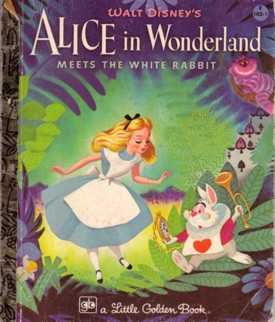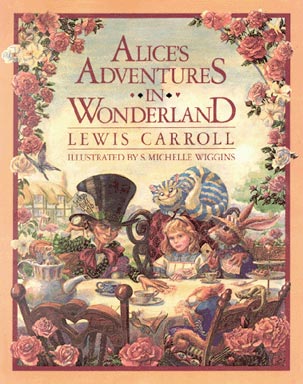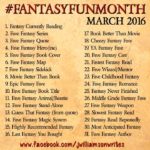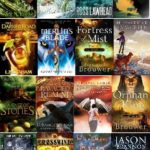Alice’s Adventures In Wonderland – 150 Years Old
 Back in 1865, US President Abraham Lincoln was assassinated, the Civil War came to an end, William Booth founded the Salvation Army, Franz Schubert’s “Unfinished Symphony” premiered, and Charles Lutwidge Dodgson published Alice’s Adventures In Wonderland under he pen name, Lewis Carroll.
Back in 1865, US President Abraham Lincoln was assassinated, the Civil War came to an end, William Booth founded the Salvation Army, Franz Schubert’s “Unfinished Symphony” premiered, and Charles Lutwidge Dodgson published Alice’s Adventures In Wonderland under he pen name, Lewis Carroll.
For many, Alice’s visits to Wonderland are the stuff of great fantasy. For me, not so much. In fact, I hate to admit it, but I’ve never actually read the full story. As a child I read a condensed version, probably put out by the Little Golden Books, but maybe by some other source. At any rate, I was less than enthralled. The story seemed absurd and nonsensical, and I really didn’t like any of the characters. The Cheshire Cat came closest, I think, to someone with a modicum of decency. But none of it had a purpose.
Although some praise the book as the first portal fantasy, and many find it imaginative and creative, I am . . . primarily bored. Alice has no goals and no real purpose for being in Wonderland beyond following the White Rabbit down his hole. Nothing there follows any set of rules, and therefore the plot points feel entirely arbitrary.
In addition, the story ends with the entire adventure being nothing more than a dream—the kiss of death to a story in today’s publishing climate.
But perhaps I’m taking issue with other readers’ favorite book (see for example this review at Fantasy Faction). I mean, the story is a classic. I assume there is a reason, but I haven’t discovered it yet.
When I encountered Lewis Carroll’s poem, “Jabberwocky,” (which appeared in Through The Looking Glass) I felt vindicated in my thoughts about his little children’s book. I mean, here was a poem that did all the right poetry things when it comes to rhyme and rhythm and other devices like alliteration, and yet it was nonsense:
‘Twas brillig, and the slithy toves
Did gyre and gimble in the wabe:
All mimsy were the borogoves,
And the mome raths outgrabe.‘Beware the Jabberwock, my son!
The jaws that bite, the claws that catch!
Beware the Jubjub bird, and shun
The frumious Bandersnatch!’He took his vorpal sword in hand:
Long time the manxome foe he sought —
So rested he by the Tumtum tree,
And stood a while in thought.And, as in uffish thought he stood,
The Jabberwock, with eyes of flame,
Came whiffling through the tulgey wood,
And burbled as it came!One two! One two! And through and through
The vorpal blade went snicker-snack!
He left it dead, and with its head
He went galumphing back.‘And hast thou slain the Jabberwock?
Come to my arms, my beamish boy!
Oh frabjous day! Callooh! Callay!’
He chortled in his joy.‘Twas brillig, and the slithy toves
Did gyre and gimble in the wabe:
All mimsy were the borogoves,
And the mome raths outgrabe.(Public Domain, posted at PoemHunter. Note: spell check had a field day with that one.)
Clearly there is some sort of story which the poem relates, but so much else of poetry is missing—particularly the emotionally evocative quality that makes a poem resonate in the soul.
And yet, there is much to praise, too. Words that are not, take on meaning. In contrast to the current trend which turns nouns and adjectives into verbs, Carroll turned a verb into an adjective (beamish) . . . I guess. It’s rather difficult to tell because some of his other nonsense words seem to suggest something familiar and still others have no apparent connection with reality at all.
 In may ways “Jabberwocky” is Alice’s Adventures In Wonderland in a nutshell. Inventive? YES! “Brillig” in its own way!
In may ways “Jabberwocky” is Alice’s Adventures In Wonderland in a nutshell. Inventive? YES! “Brillig” in its own way!
And yet, who cares? So Alice had a dream in which illogical things happened. So the beamish boy decapitated the Jabberwock. Are we readers to go and do likewise? In other words, what do either of these works reveal about human nature? In the case of Alice’s Adventures In Wonderland, at least, that should be a fair question because fiction seems to carry that requirement.
Is the great achievement of this work the fact that Carroll opens up the world of the imagination? That he allows for the magical and mysterious, and does so apart from God?
In fact, Carroll’s fiction falls into a category known as Literary Nonsense:
In literary nonsense, certain formal elements of language and logic that facilitate meaning are balanced by elements that negate meaning. These formal elements include semantics, syntax, phonetics, context, representation, and formal diction. The genre is most easily recognizable by the various techniques or devices it uses to create this balance of meaning and lack of meaning, such as faulty cause and effect, portmanteau, neologism, reversals and inversions, imprecision (including gibberish), simultaneity, picture/text incongruity, arbitrariness, infinite repetition, negativity or mirroring, and misappropriation. (Wikipedia)
If only I’d understood as a child that the story wasn’t supposed to make sense, maybe I would have liked it better.
At any rate, I found it interesting that the analysis of Literary Nonsense draws a clear line between it and fantasy:
Nonsense is distinct from fantasy, though there are sometimes resemblances between them. While nonsense may employ the strange creatures, other worldly situations, magic, and talking animals of fantasy, these supernatural phenomena are not nonsensical if they have a discernible logic supporting their existence. The distinction lies in the coherent and unified nature of fantasy.
As for me, I’ll stick with the coherent and unified. Still, I can’t help but give Lewis Carroll a nod by noting the fact that Alice’s Adventures In Wonderland has lasted so long and continues to spark the imagination of other writers. For this reason, if for nothing else, I’d say speculative readers and writers alike have much to be grateful for regarding this little children’s book. Happy birthday, Alice.
So where do you as a reader fall in the Alice In Wonderland love/hate spectrum? Have you read the book, or some condensed version of it? Did you watch the recent TV spin off of the story? Do you prefer fantasy to Literary Nonsense, or the other way around?










































I’ve never cared for the story either. I didn’t mind the recent movie very much but that’s because it felt like it made a little sense (and it wasn’t a dream!). I have no patience for nonsense – to me it feels like a pointless waste of time.
I read the book not too long ago and thought it was funny. At points, hilarious. As I’ve read, many interpret the story to be a spoof of politics of the time in the guise of a children’s story.
But I knew that going into it, so I was sort of looking for it. I enjoyed reading it.
Being what it was, I don’t think the dream ending made much difference. Kids don’t mind that, they just enjoy the adventure(s) anyway. It affirms their own daydreams. You’ll note that the “Wizard of Oz” also ends with the whole thing being a dream. At least on the surface.
Adult fiction, however, that would be more of a let down because we want it to be “real” and matter in the context of the story.
I’m with you, I don’t care for Alice, but I was a big fan of the Oz books as a kid. I read the first three books, and aside from a weird subplot with a girl magically transformed into a boy, I rather liked them. But after book four, the whole thing gets a ride on the crazy train and blazes away in a flash of sentient robots, Frankenstein-Ish bridegrooms, and a six foot tall, tuxedo clad, frog.
Ozma – the boy who was a girl! I remember that one. I’m with you – the first few were decent and then they just went crazy trying to capitalize on the franchise, I guess.
What was with that Chopfyte thing?! I wanted the Tin Man to find love, not to mention that’s just wrong!
Very just wrong!
Out of all the Disney movies, I disliked Alice the most. I disliked nonsense as a kid, and still do. Doesn’t mean i am mundane…as a kid i watched and loved Yellow Submarine for example. Just the weird things need to have their own internal logic. The book I read much later, but it never stuck with me because her visit to Wonderland was utterly pointless-a bad fever dream.
“Just the weird things need to have their own internal logic.”
No, not really. The only internal logic Nonsense needs to have is whatever strange connection conceived it in the writer’s mind. Otherwise it is only something else trying to dress itself up as Nonsense.
Yeah that’s why I dislike nonsense. With no internal logic it’s just free association by the writer, and the reader is not the writer. The things in their mind that make the connections aren’t present, and it winds up being a mess.
Well, bother, I wrote a response extolling the virtues of Alice in Wonderland and its companion book Through the Looking Glass and it was all eaten by the internet because I hadn’t typed my email address in the box above. 🙁
In brief,
I wish that I could collect my experience of those books into a bottle saying “drink me” and cyber-share it. They are perfectly ridiculous and full of the delight of words in all their idiosyncrasies and contradictions.
And the sweet melancholy of the ending of Alice in Wonderland is only surpassed by succinct surprise of chapter 11 and the following seriously silly question at the very end of Through the Looking Glass.
Also, I refuse to choose between Fantasy and Literary Nonsense, I will have them both (Precioussss!). o:)
So many quotables. So many wonderful visuals. Have you never heard of dream logic? Through the Looking Glass is a chess game.
C.S. Lewis said that the more exotic the story is, the plainer the main character needs to be. I don’t know that that is true, but it’s what he said about Alice.
The highlight of family gatherings around a campfire is my husband’s recitation of Jabberwocky and The Walrus and The Carpenter.
Can I connect these above thoughts into a coherent whole? No, not really. I don’t care much for Lear’s or Nash’s nonsense, but I do love mathematician Dodgson’s.
Such an interesting discussion–both sides. I knew there had to be people who still love Alice and her journeys into Wonderland, but I’m glad to know I’m not on an island, vainly raging at nonsense alone.
A chess game, Lelia? I’d expect logic from that, and certainly order, at least in the end. Maybe I haven’t read enough.
I certainly understand the cleverness of Carroll’s use of words, but I need content, not just style.
Still, a very interesting discussion. Thanks for each of you weighing in and shedding light on your perspectives.
Becky
I’m indifferent to Alice. The purpose seems to be to inspire “memes” and images, not to tell a fun story. There’s a late-19th-century “too cool for this school” kind of vibe also shared by tales like Peter Pan that seem to revel in the quasi-grimdark, dark-humor atmosphere: chopping off parts, bratty children, evil adults, and so on. I’m not necessarily condemning, just saying that I join Becky in saying I don’t much see the point of “nonsense literature” beyond a quick look and then moving on, if that.
Small correction with larger consequences: “Jabberwocky,” one of my favorite poems (and the inspiration for some of my fan fiction, even) is from the much better sequel, Alice Through the Looking Glass. While I find Wonderland rather ho-hum on the whole, Looking Glass has an actual story, with far better wit and an Alice that actually exists more as a character than an author/reader mouthpiece.
**PS: is something wrong with the link button in the comments edit box?
I’m in the Alice camp. I loved these books as a kid. Read them over and over. I loved the whole “drink me” and the shrinking and growing Alice, the Tea Party, the rabbit, the Cheshire Cat….loved it all. Especially the poems. “Twas brillig and the slithy toves….” How can you not love that? I loved words as a child, and loved making up words for things. Here was an author who did just that, and made them sing when he did. It didn’t make sense? Who cares! The adult world didn’t make much sense to me either. This was a delightful dip into a strange and nonsensical world, with Alice as a guide. I really, really loved it and still do….although I haven’t read it as an adult. So it might be different if I had been an adult when I read it? I have always loved portal fantasy….probably because I loved Alice In Wonderland and Through the Looking Glass first. I have never put the two together till now. 🙂
When I was little, I only saw the Disney movie and some live action movie for Alice and hated them. I think something about being trapped in a weird and dangerous world that made no sense creeped me out. But I started seeing people do interesting things with Alice over the last year or two, and even read a couple of the stories people made based off the world. Then one of my story ideas ended up being loosely based off Alice, which lead me to read the original Alice stories, and I liked them.
I felt the originals were better than the Disney movie, where they mainly painted Wonderland as a place opposite of what one would expect. The original, on the other hand, painted a world with some insanity but with some underlying plot and things that actually made sense. Most of the chars seemed to want to live, for instance, while some in the Disney movie seemed to be eager to die simply because it would be unexpected to be audience.
I enjoyed Splintered by A. G. Howard, a somewhat morbid book featuring a descendant of Alice. And then I have enjoyed several songs using Alice as a theme.
I think I mainly enjoy Alice as a bit of a myth and theme to work with in stories. When it comes to some of the stories I am working on, I have found several useful things to draw truth from. With the Mock Turtle, for instance, there can be a representation of those who are sad but difficult to help because their pain is not easily understood by others.
I loved Alice in Wonderland as a kid. The weirdness of the story, the jumbled nature of episodes, were exactly what appealed to me. The whole point of the story was Alice’s quest to go home, so it made sense that she had random, disconnected adventures along the way. I found the disjointed nature of the story to be exactly like a dream, which justified the dream ending, and the newness of each encounter is what tied me to the book and kept me reading as a child.
I still love it as an adult, although mostly for its nostalgic value. Yes, there are a lot of things about the plot that simply wouldn’t be printed in today’s market, and elements like the dream ending are so overdone today… but it was new and fresh 150 years ago. When Alice was first published, stories written specifically for children was a new genre. Alice in Wonderland was doing then what many speculative authors hope to do today… breaking literary ground and experimenting with what had never been done before. And Alice did it well, as is seen by the fact that it is still being published and discussed today.
For those who want a more sophisticated, grown-up version of Alice’s story, I recommend Frank Beddor’s series The Looking Glass Wars. This trilogy re-imagines Alice’s story through the lens of today’s speculative fiction, and has a bit more of a bite.